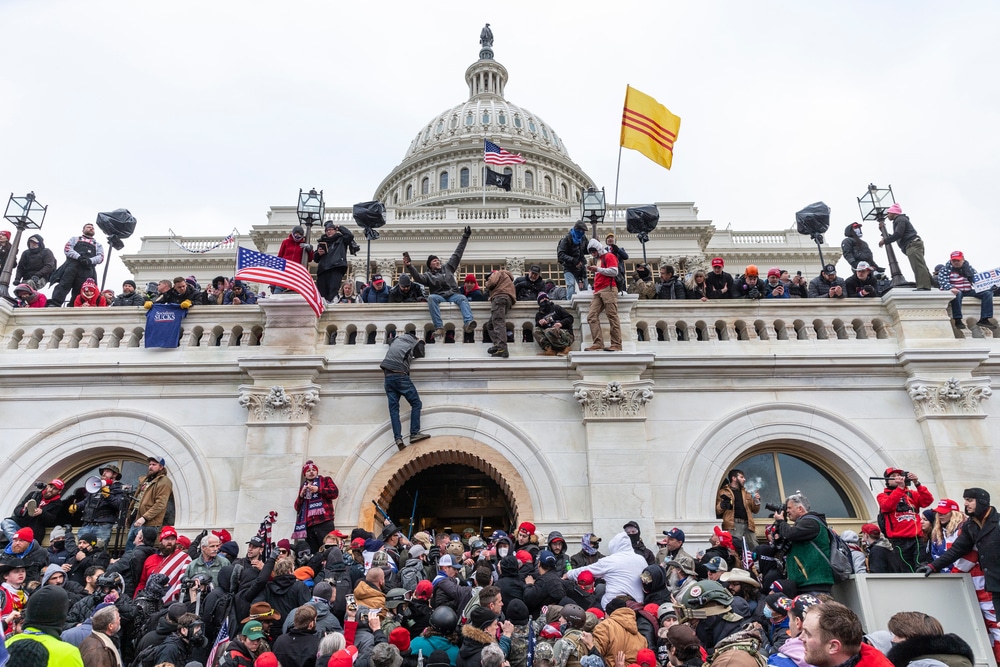While most employees were settling into the first full workweek of 2021, some traveled to Washington, D.C., on Wednesday, January 6, to attend a “Save America Rally.” As everyone knows, the ensuing showdown at the U.S. Capitol led to destruction, deaths, arrests, and, for some individuals, termination from their jobs. Here is a primer on the employment law implications.
Rioters’ Social Media Posts Were Revealing
Videos have been posted of people from all over the country who stormed the Capitol to protest the 2020 presidential election results. As usual, social media was buzzing with attempts to identify the demonstrators, and with astonishing speed several people who breached the building have been identified by name, hometown, and, in some cases, their place of employment (including a former employee who was wearing his employee nametag).
A number of employers have publicly fired the protesters. A Chicago news station reported a local real estate company terminated an agent after her social media post revealed she had participated in “storming the Capitol.” An insurance company similarly parted ways with an in-house attorney who livestreamed his activities outside the legislative building.
Hey, What About Free Speech?
As more rally rioters are outed (or “doxed”), we’ll likely see more efforts to urge and/or publicly shame their employers to fire them. Would the terminations be legal? We think discharging employees who participated in the Capitol violence is permitted under the law.
The starting point in such matters is the First Amendment to the Constitution, and the argument can be dispensed with rather quickly. While participating in the Save America Rally is likely political speech, most employees in the private sector (more about that below) don’t have a constitutionally protected right of free speech with respect to their employment. That’s because the First Amendment only protects against the government’s enactment of laws abridging free speech. For public employers, the result could be different (absent any violence) since they are in fact affected by constitutional restrictions.
Who and What Could Be Protected?
Many states have laws protecting employees from discrimination and retaliation for voting, serving in public office, or attempting to influence their right to vote. In addition, many states protect employees for off-duty conduct.
Similarly, some states treat an employee’s political beliefs like other protected classes. For example, in Washington, D.C., political belief is a protected class. In New York, employers may not discriminate against employees based on their support for any political party or for off-duty conduct including political activities. Could the state statutes protect employees who participated in the January 6 rally?
The state statutes would likely protect only employees who peacefully participated in the rally. What isn’t protected under the First Amendment or the state statutes is any criminal activity that occurs as a result of the political belief. The employees who have been doxed on social media and publicly terminated were fired because of the violence associated with storming the Capitol, not for their political beliefs.
Private employers aren’t prohibited from basing termination decisions or other adverse employment actions on an employee’s expression of political beliefs if it resulted in criminal activity like storming the Capitol.
What About Social Media Posts?
What can an employer do (or not do, as the case may be) if you have an employee who publicly supports the rioters? Or what about the employee whose social media posts contain hate speech and profanity or are supportive of the Proud Boys or a similar group?
We know that if you are a private employer, the First Amendment does not apply to an employee’s political speech, but that begs the question—can a private employer fire an employee for engaging in the behavior? The answer is yes, with some caveats.
If you are outside Minnesota, make sure your state statute doesn’t protect employees who engage in lawful off-duty political conduct. If you live in a state that does protect the conduct (California, Colorado, Louisiana, New York, and North Dakota), be careful with your decision. For example, it’s likely you can’t fire an employee who simply “liked” the post of an attendee at the Save America Rally, but the result could be different for a worker who “liked” the post and encouraged continuing efforts to destroy federal property.
If you don’t live in a state that protects off-duty political conduct, you could terminate employees for public support of the rioters or hate speech. Our advice, however, is to be careful and judicious in your decision-making.
First, make sure you have an updated and thorough social media policy. Second, be sure you have fully considered all the facts surrounding the employee’s post:
- What did the employee say?
- Did he encourage violence or other unlawful action?
- Who is the audience, and what was its reach?
- Does the post implicate other protected classes such as race, religion, or gender?
- Does the post support political-related violence?
- Does it endorse a perspective encouraging discrimination based on race, color, or creed?
Finally, and most important, be certain you have your facts straight (as you should with all terminations).
For all of the reports naming employees who stormed the Capitol, we’ve also seen accounts of participants having been wrongfully identified. Terminating an employee over the mistaken belief he stormed the Capitol or made a white nationalist post could result in a defamation or other wrongful discharge claim.
Takeaways for Employers
In the absence of a state statute protecting an employee’s political beliefs, private employers aren’t prohibited from basing termination decisions or other adverse employment actions on an employee’s expression of political beliefs if it results in criminal activity like ransacking the Capitol. As with any employment decisions, however, be sure you have all of the details (and not “alternative facts”).
Penelope J. Phillips is an attorney with Felhaber Larson in Minneapolis, Minnesota. You can reach her at pphillips@felhaber.com.
The post Yes, You Can Probably Fire Employee Who Raided Capitol appeared first on HR Daily Advisor.
